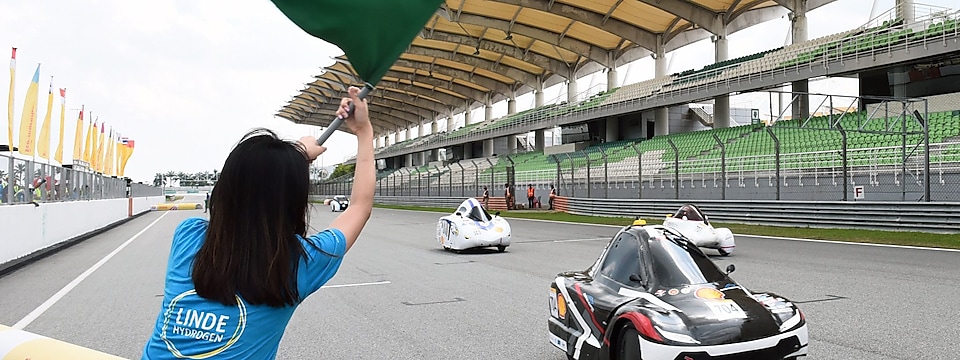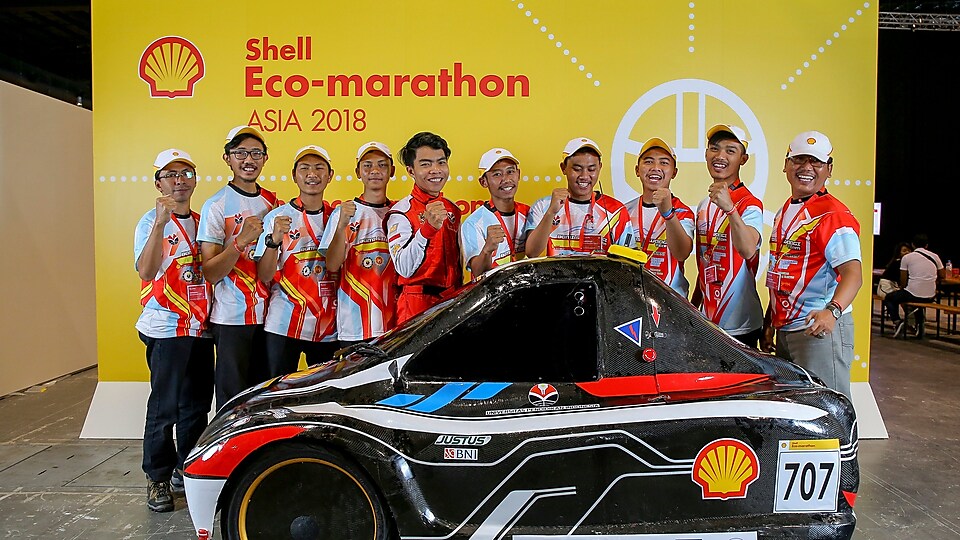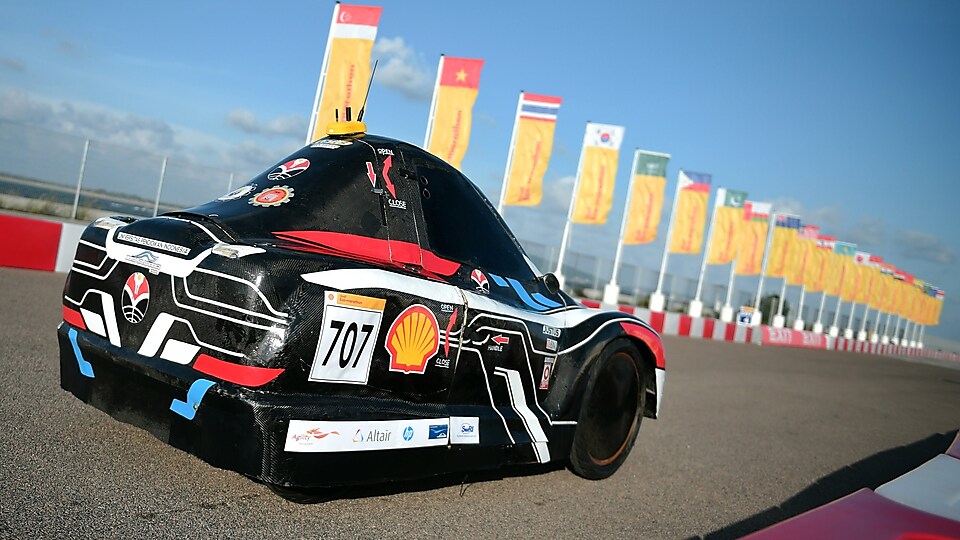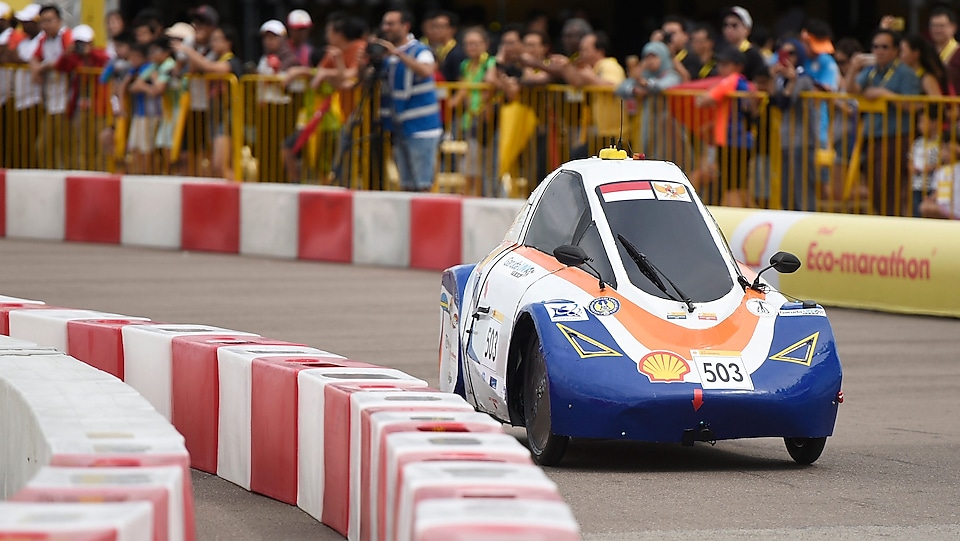
Under The Hood with Bumi Siliwangi 4 Team
The story of The Bumi Siliwangi 4 Team who won the Shell Eco-marathon 2019 and created an innovative energy-efficient vehicle.
Let's face it together. Prove our existence and together, let's make this country proud!
Kusyandi, Team Manager
There is no doubt why the Bumi Siliwangi 4 team from the University of Education in Indonesia (UPI), who always takes a step further than the others, is the reigning champion in Shell Eco-marathon. Bringing the pride of Tanah Pasundan, this team has achieved various achievements since the 2016 Shell Eco-marathon. Their winning journey starts with their runner-up position in the Urban Concept for electric battery category, which gave them the opportunity to participate in the Drivers’ World Championship (DWC) in London. Their electric vehicle called the Turangga Cheta EV-3 managed to gain the first place in the 2016 DWC, defeating every competitor from across the globe.
But their journey is yet to be over. Bumi Siliwangi 4 continues their SEM journey and won another award in the third place in the electric battery category in 2018 and in 2019 with their Turangga Cheta EV7 with a record winning speed of 164 km/kWh.
It is a proven fact that Bumi Siliwangi highly dedicate themselves to explore the complexity of the machine in order to create an innovative and energy-efficient vehicle. But, what’s the story behind Bumi Siliwangi’s success?
The Bumi Siliwangi team have shared exclusively about the twists and turns of making the nation proud through SEM, from falling asleep in class, conquering expectations from others, and to putting an all nighter.
Let’s all view Bumi Siliwangi's journey in pursuit of chasing the ultimate speed.
Kusyandi (KUS), Team Manager, SEM Asia 2019
Frendy Kristiantoro (FK), Team Member, SEM Asia 2019
Rheihanita Noer (RN), Team Member

Bumi Siliwangi Team from Pendidikan Indonesia University, competing in Urban Concept category - Battery Electric in Singapore in 2018. (Shaun Tay/AP)
What is the most memorable story about Bumi Siliwangi?
KUS: Maintaining (at winning place) is very hard for the team, sometimes it becomes a big pressure in itself. However, thanks to the desire to be better, that pressure becomes a motivation to continuously innovate, especially in improving the quality of vehicles. There are many stories that are memorable, such as dedicating a sleepless 48 hours of work, going to college without taking a shower, and many more.
FK: Even in highs and lows, we always have a strong determination and sincerity when it comes for the team, university, and the nation. Personally for me, the story is how I’ve sacrificed my academics, meaning having difficulties adjusting with peers, being late or falling asleep in class, and even being scolded by my lecturer. All of these will never be forgotten even until we’ve finally shown the best of ourselves.
RN: Working on the job description until early dawn. Yet we have become closer with other teammates because of that, and teamwork can be better established because we are connected to each other.
Were there any difficulties in managing time and academic responsibilities?
KUS: Yes. Alhamdulilah, we are supported by all of the UPI academics, which makes it easier to manage time and all of the responsibilities.
FK: Managing time and responsibilities is difficult, but it all comes back to us on how we deal with time management and our personal academics. Personally, I’ve always believed that all of this is a battle for myself and for my parents.
RN: Maybe a little. We have been accustomed to managing and dividing our time between Shell Eco-marathon and academic competitions, so that both could go well and reach the maximum potential.
Continuously winning the SEM is certainly one’s glory. But how did you and your team cope with the pressure and expectation of being the reigning champions?
KUS: By turning pressure into motivation, keep on innovating, and never think all of it as a burden. The main reason why UPI survives as a champion is because we manufacture our vehicles 100% by ourselves. Starting from the body, frame, electrical, controller, and to other parts. There is a sense of love and pride for that vehicle.
FK: Facing pressure is certainly not easy, but that is a benchmark for our evaluation, target, and in terms of process and results. But, whatever becomes the result, I believe that’s the best outcome from our teamwork.
RN: You keep trying to give the best and do the best. This means giving the best during the process, which means sacrificing time to compete in the Shell Eco-Marathon.
Facing great competitors from different parts of the world must certainly give a different kind of pressure. Especially with the fact that your team is representing the country. So, how did you face that challenge?
KUS: We noticed that the Bumi Siliwangi team is not as big as the other teams, we live in a really small mechanical workshop. However, everyone always tries to help and keep trying, even with the most minimal facility and infrastructure. We also try to follow the other team’s development, so we can formulate the best strategy and continue to compete with them.
FK: There will always be challenges, and also pessimism. But, we can always learn from each other's strengths and weaknesses. Even though SEM and our academic life could be quite challenging, without us knowing we managed to take care of ourselves, to never give up, and always be grateful.
RN: We came from an education-based university, so we need to work hard in proving that we can compete against other engineering-based universities.

Bumi Siliwangi Team competes in Urban Concept Category - Battery Electric in Singapore in 2018. (Joe Nair/AP)
How do you think SEM will help develop sustainable and renewable energy while also developing potential world-class engineers in the future?
KUS: SEM gives young Indonesians a chance to participate directly in the field. SEM also helps students apply their current knowledge. The learning process generates a more tangible product, which I think is what is needed to become a world-class engineer.
FK: It’s very helpful and plays a huge role in the future of technology in Indonesia and the rest of the world. We can learn from each other in SEM, generating innovations and ideas to move forward. This process will produce results for technologies in the future, with technological developments coming each year in order to move forward and face the world.
RN: SEM produces new and renewable innovations that can be applied for the development of sustainable energy, spurring us to think more critically and to continuously innovate.
After returning to Indonesia, what was the most valuable lesson you have learned from participating in SEM?
KUS: Material or physical objects are not everything, but determination and a strong motivation are the most important thing you need. I prioritise keeping my spirit high when it comes to further invent environmentally friendly vehicles in this country.
FK: One of the most valuable lessons is to always be grateful to ourselves. I am very proud, especially of my parents who have prayed and strive forward for me. So I am excited to do the best for myself and for the advancement of the automotive industry.
RN: I learned to appreciate time because time cannot be repeated and must be used to the max. I am proud and always excited to do research, innovate and to contribute in creating environmentally friendly energy in the future.
What is your message for young Indonesians who are eager to make the country proud, or are interested in participating in the SEM competition?
.KUS: Let's face it together. Prove our existence, we can do it. Together, let’s make this country proud!
FK: To young Indonesians, ask yourself, what will we give to the country, not what the country will give to us.
RN: Do and give the best version of yourself. If we have given our best, we will feel proud even though the results are not always in line with the desired expectations.
Read More Stories
Under The Hood with Antasena, Institut Teknologi Sepuluh Nopember
Bringing energy-efficient vehicles to the world.
Under The Hood with Garuda UNY Eco Team, Universitas Negeri Yogyakarta
The story behind the team that are persistent in bringing the most energy-efficient innovation.

